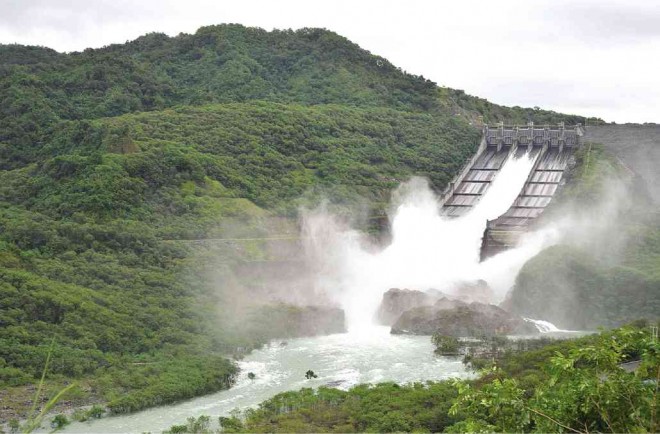
THE SAN ROQUE Dam in San Manuel, Pangasinan province, let out water to the Agno River at the height of heavy rain recently. ROGER TINGLE/Contributor
SAN RAFAEL, Bulacan—Water has started flowing to irrigation canals in Bulacan and Pampanga farmlands this week, now that Angat Dam’s water reservoir levels have stabilized.
The National Water Resources Board (NWRB) has approved the discharge of 10 cubic meters per second of water to the canals of the Angat-Maasim River Irrigation System (Amris), as requested by the National Irrigation Administration (NIA).
The fresh irrigation supply was a result of the October onslaught of Typhoon “Lando,” which submerged areas of Central Luzon, and replenished Angat Dam’s reservoir.
The water allocation would benefit as much as 10,000 hectares of irrigable farmlands in Bulacan and Pampanga, said Angelito Miguel, division manager of NIA’s Bulacan-Aurora-Nueva Ecija Provincial Irrigation and Management Office.
“We requested the water allocation to sustain our standing crops for the wet season. The water supply will suffice since many farmers have already harvested their crops,” Miguel said.
The supply would last until the end of the month, he said, adding that NIA may request further allocations by December, if necessary.
“We still have crops set to be harvested by January, but it will be only about 1,000 ha,” he said.
Rain-dependent
For the past months, Amris had been depending on the discharges of Bustos Dam, which carried water coming from the Bayabas River and from the spills of Angat Dam, Miguel said. Some farmers depended on the rains, he said.
In Pulilan town, farmers’ groups have started cleaning irrigation canals to enable water to reach lateral portions of the irrigation system.
The NWRB has also approved the discharge of water for Metro Manila’s domestic supply. More than 90 percent of Manila’s water needs come from Angat Dam.
In Tabuk City in Kalinga province, NIA Administrator Florencio Padernal granted a contractor a 91-day extension to complete the P425-million rehabilitation of the Upper Chico River Irrigation System (UCRIS), which was financed by the World Bank.
Delays in UCRIS repairs forced Tabuk farmers to abandon the cropping season in August. The Upper Chico River Irrigation System Federation of Irrigators’ Associations (UCRIS-FIA) had blamed the contractor’s poor performance for lost opportunities when they delayed planting on 6,801 ha of farmland and 8,451 ha more in Quezon province, which are also served by UCRIS.
The UCRIS facility was also damaged by Typhoon “Ineng” in August.
NIA assured the farmers that the contractual extension to March 21, 2016, from Dec. 21, would not affect its guarantee that irrigation water would flow by January 2016.
“How could they release the water in January for us to be able to farm next cropping season when the bulk of the remaining work is in the main canal?” said Adolf Bravo, UCRIS-FIA secretary. Reports from Ron Lopez, Inquirer Central Luzon, and Estanislao Albano Jr., Contributor